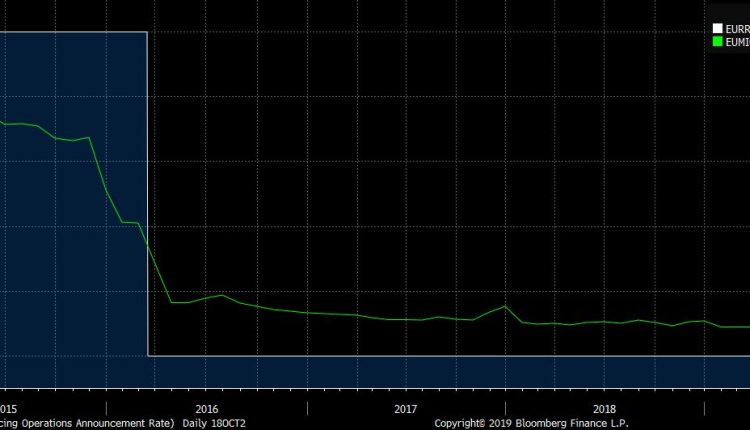The European Central Bank will be holding its monetary policy meeting this week on Thursday.
This will be the last monetary policy meeting for Mario Draghi. Draghi was instrumental in steering the eurozone through the major global downturns during his eight-year tenure.
This included the global financial crisis and as well as Greece’s sovereign debt crisis.
Investors do not expect to see much action from this week’s meeting. Despite the various measures undertaken by Draghi, the outgoing ECB chief still faces criticism. Draghi hands over the reins of the central bank to ex-IMF chief Christine Lagarde.

Lagarde will officially take over the affairs of the European Central Bank starting the 1st of November 2019.
The ECB’s deposit facility rate and the marginal lending rate will remain steady at this week’s meeting. The rather flat expectations come as investors wait for the ECB’s QE to get started.
The central bank will begin its Asset Purchase Program starting November 1st.
Concerns on Negative Rates Gains Traction
It is not surprising the various members of the ECB’s governing council have started to criticize the negative interest rates. But this is something not new. Similar views can be seen from the Bank of Japan.
In Japan, despite launching a massive QE program, the Bank of Japan has failed to stimulate the economy. Inflation remains stubbornly low. But the negative rate continues which is seen harming the banking system.
The ECB’s deposit facility rate turned negative for the first time in June 2014, after staying at zero for most of 2012 and 2013.
Still, the central bank has nothing to show for.
While the ECB ended its QE in December 2018 amid signs of a pickup in growth, it was only for a short while. Growth sputtered since late 2018 and began to deteriorate thereafter. This prompted the central bank to revive its QE program.
The deposit facility was further cut down by a quarter-point to -0.50%.
The recent move by the ECB was in tandem with the global theme. Monetary policy, which was dovish only until the start of the year has taken a turn for the worse.
Various major central banks such as the Fed, the BoJ, RBA and the RBNZ have been on a dovish policy path.
Draghi Calls for Fiscal Spending
In a speech at an event in Washington, Draghi said that eurozone governments should do more. This has been something that Draghi has been very vocal about. Urging the various regional governments to revive spending, Draghi has always maintained the view monetary policy alone would not help in reviving growth.
As the last meeting concludes, investors will already be looking to the new incoming ECB President, Lagarde. The eurozone’s inflation remains well below the 2.0% inflation target.
Recent inflation reports saw the eurozone consumer prices falling further to 0.9% on the year. Meanwhile, core inflation has held steady at 1.0%. This is far off from the central bank’s inflation target rate.
It is, therefore, not surprising that various members of the central bank’s governing council are looking for ways to stoke inflation. With monetary policy not having much to show for, questions remain whether the ECB will look to new ways.
For the moment, investors do not expect to see much happening. The incoming ECB President will preside over QE 2. It will not be surprising to see some governing council members shifting focus to Lagarde.
However, the prospects of a drastic shift to the ECB’s policies remains unlikely for the moment.
